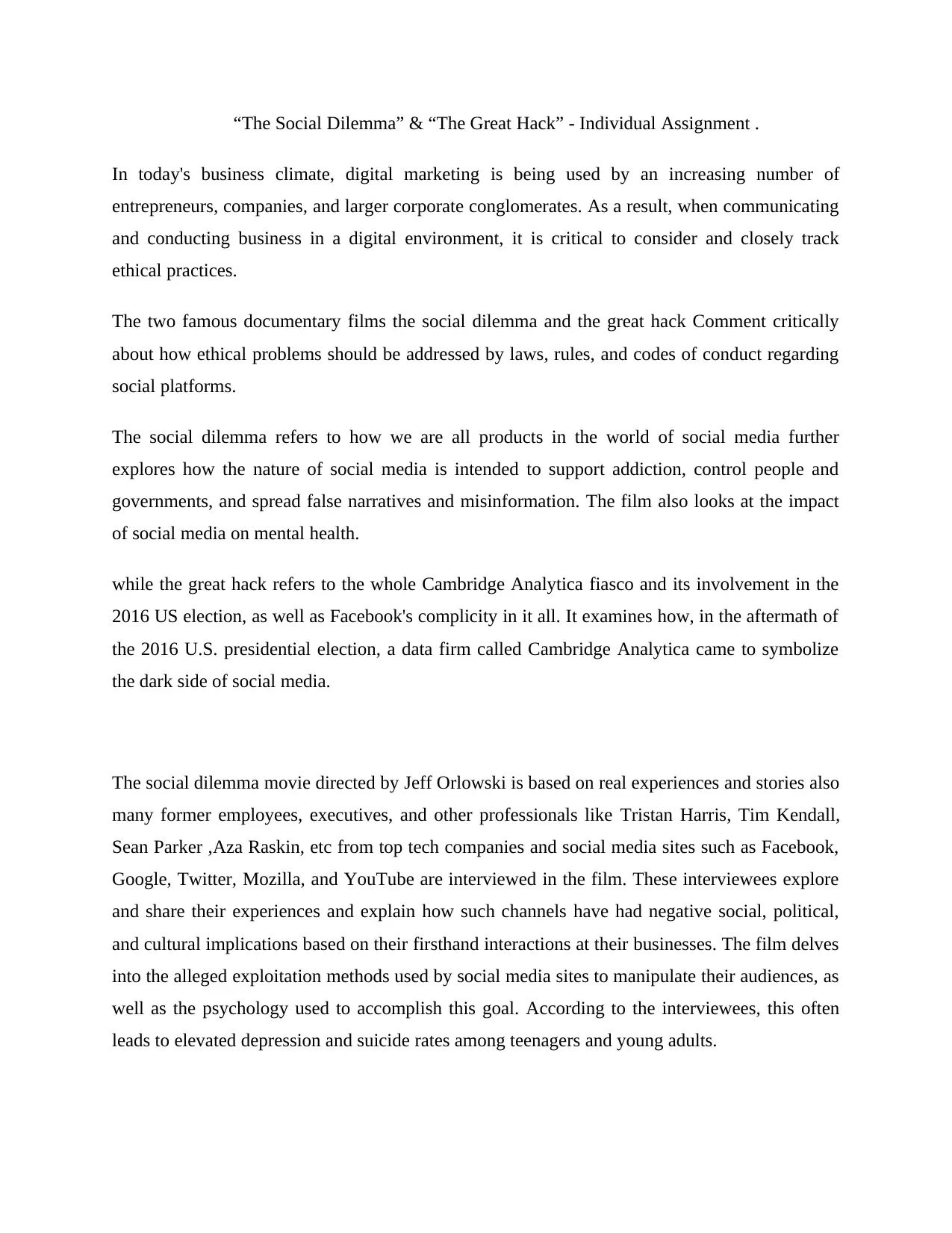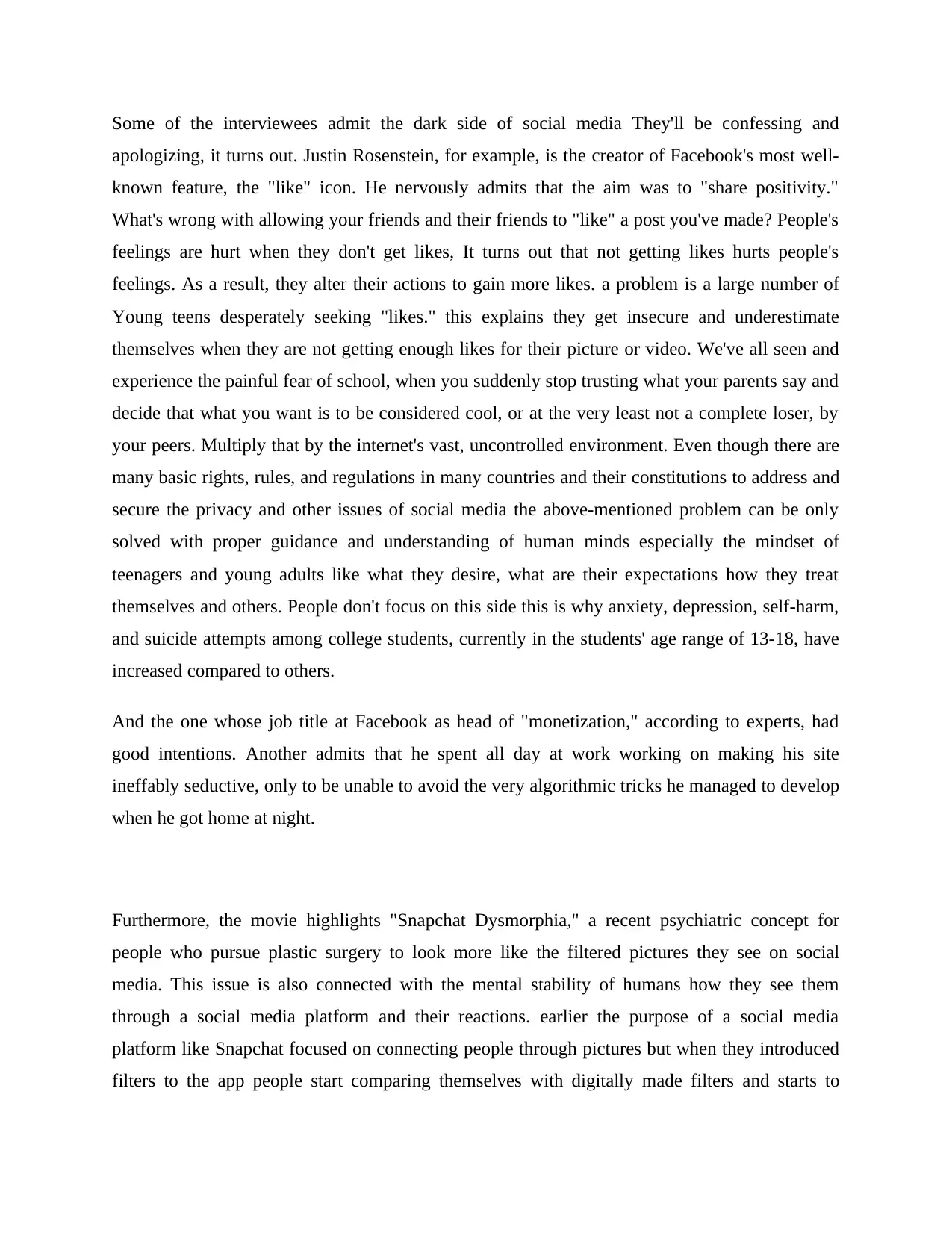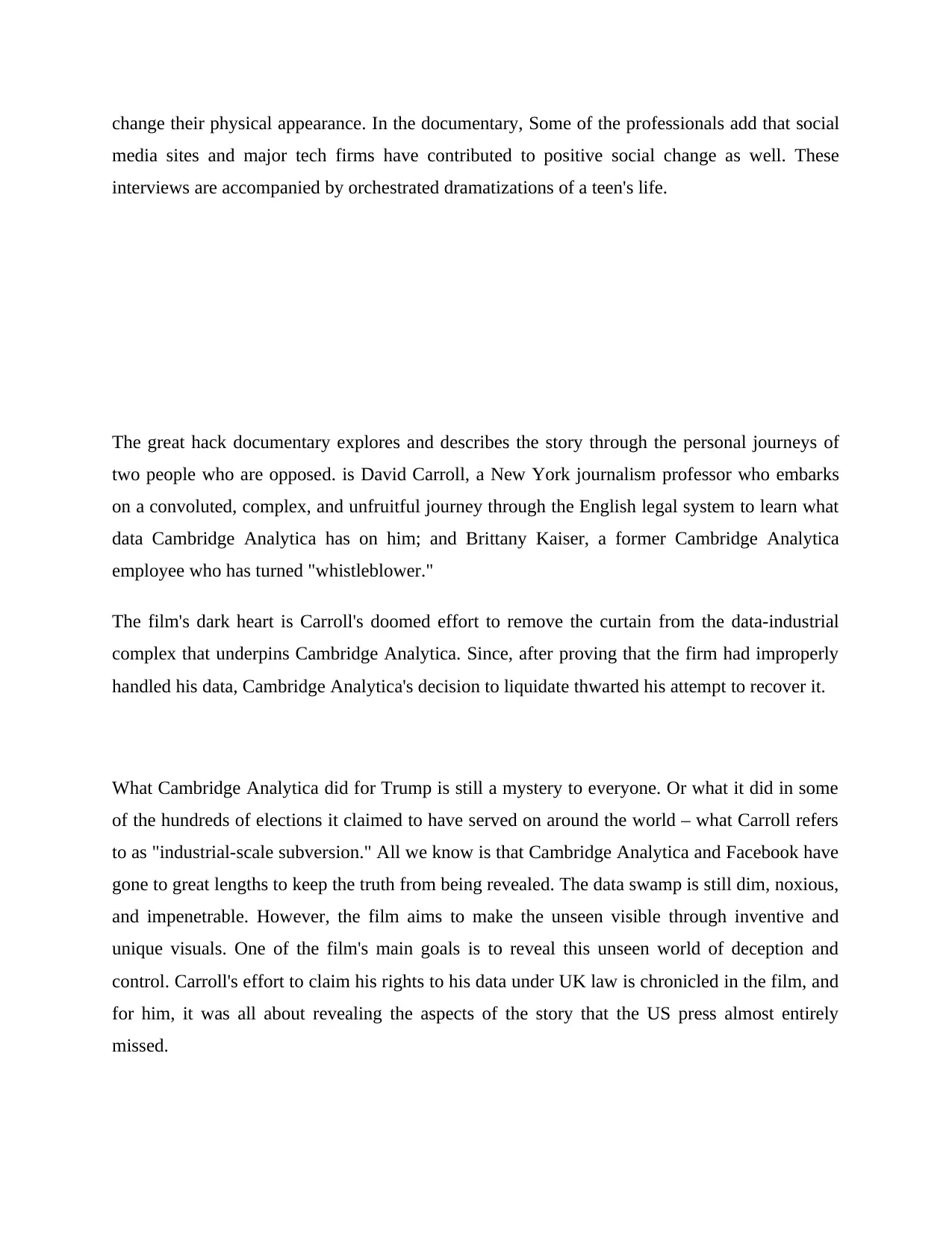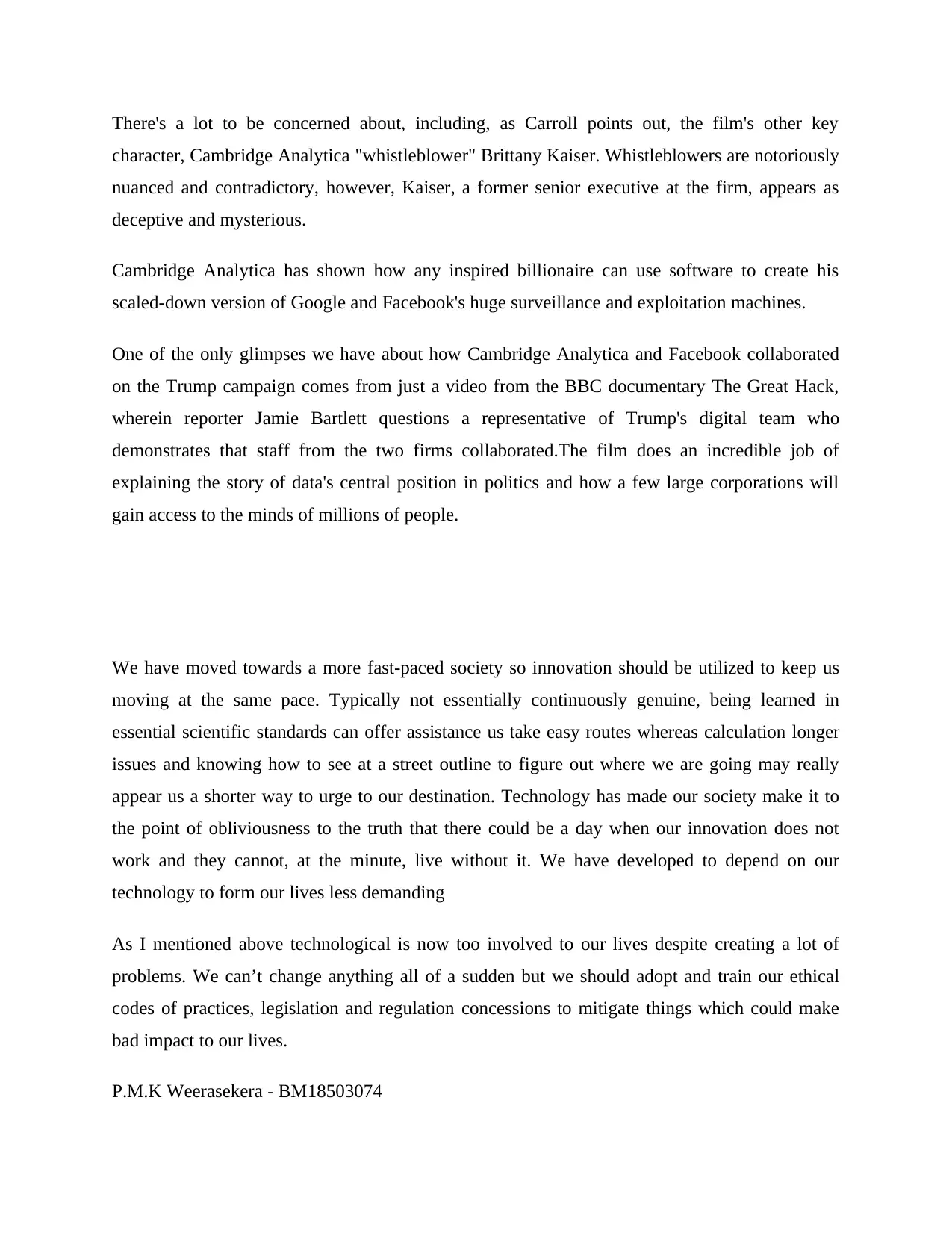BM18503074: Social Dilemma & The Great Hack Ethical Analysis Report
VerifiedAdded on 2021/05/28
|4
|1503
|707
Report
AI Summary
This report critically examines ethical issues in digital marketing and social media, focusing on the documentaries "The Social Dilemma" and "The Great Hack." It analyzes how social platforms impact mental health, spread misinformation, and manipulate users, drawing on interviews with tech insiders and exploring the Cambridge Analytica scandal. The report discusses the need for laws, rules, and codes of conduct to address these ethical problems, particularly concerning data privacy, addiction, and the exploitation of user data. It highlights the psychological manipulation employed by social media, the impact on teenagers, and the role of technology in shaping societal behaviors, emphasizing the need for ethical practices, legislation and regulation concessions to mitigate things which could make bad impact to our lives. The report also explores the role of whistleblowers and the data-industrial complex, advocating for greater transparency and user data rights in the digital landscape.

“The Social Dilemma” & “The Great Hack” - Individual Assignment .
In today's business climate, digital marketing is being used by an increasing number of
entrepreneurs, companies, and larger corporate conglomerates. As a result, when communicating
and conducting business in a digital environment, it is critical to consider and closely track
ethical practices.
The two famous documentary films the social dilemma and the great hack Comment critically
about how ethical problems should be addressed by laws, rules, and codes of conduct regarding
social platforms.
The social dilemma refers to how we are all products in the world of social media further
explores how the nature of social media is intended to support addiction, control people and
governments, and spread false narratives and misinformation. The film also looks at the impact
of social media on mental health.
while the great hack refers to the whole Cambridge Analytica fiasco and its involvement in the
2016 US election, as well as Facebook's complicity in it all. It examines how, in the aftermath of
the 2016 U.S. presidential election, a data firm called Cambridge Analytica came to symbolize
the dark side of social media.
The social dilemma movie directed by Jeff Orlowski is based on real experiences and stories also
many former employees, executives, and other professionals like Tristan Harris, Tim Kendall,
Sean Parker ,Aza Raskin, etc from top tech companies and social media sites such as Facebook,
Google, Twitter, Mozilla, and YouTube are interviewed in the film. These interviewees explore
and share their experiences and explain how such channels have had negative social, political,
and cultural implications based on their firsthand interactions at their businesses. The film delves
into the alleged exploitation methods used by social media sites to manipulate their audiences, as
well as the psychology used to accomplish this goal. According to the interviewees, this often
leads to elevated depression and suicide rates among teenagers and young adults.
In today's business climate, digital marketing is being used by an increasing number of
entrepreneurs, companies, and larger corporate conglomerates. As a result, when communicating
and conducting business in a digital environment, it is critical to consider and closely track
ethical practices.
The two famous documentary films the social dilemma and the great hack Comment critically
about how ethical problems should be addressed by laws, rules, and codes of conduct regarding
social platforms.
The social dilemma refers to how we are all products in the world of social media further
explores how the nature of social media is intended to support addiction, control people and
governments, and spread false narratives and misinformation. The film also looks at the impact
of social media on mental health.
while the great hack refers to the whole Cambridge Analytica fiasco and its involvement in the
2016 US election, as well as Facebook's complicity in it all. It examines how, in the aftermath of
the 2016 U.S. presidential election, a data firm called Cambridge Analytica came to symbolize
the dark side of social media.
The social dilemma movie directed by Jeff Orlowski is based on real experiences and stories also
many former employees, executives, and other professionals like Tristan Harris, Tim Kendall,
Sean Parker ,Aza Raskin, etc from top tech companies and social media sites such as Facebook,
Google, Twitter, Mozilla, and YouTube are interviewed in the film. These interviewees explore
and share their experiences and explain how such channels have had negative social, political,
and cultural implications based on their firsthand interactions at their businesses. The film delves
into the alleged exploitation methods used by social media sites to manipulate their audiences, as
well as the psychology used to accomplish this goal. According to the interviewees, this often
leads to elevated depression and suicide rates among teenagers and young adults.
Paraphrase This Document
Need a fresh take? Get an instant paraphrase of this document with our AI Paraphraser

Some of the interviewees admit the dark side of social media They'll be confessing and
apologizing, it turns out. Justin Rosenstein, for example, is the creator of Facebook's most well-
known feature, the "like" icon. He nervously admits that the aim was to "share positivity."
What's wrong with allowing your friends and their friends to "like" a post you've made? People's
feelings are hurt when they don't get likes, It turns out that not getting likes hurts people's
feelings. As a result, they alter their actions to gain more likes. a problem is a large number of
Young teens desperately seeking "likes." this explains they get insecure and underestimate
themselves when they are not getting enough likes for their picture or video. We've all seen and
experience the painful fear of school, when you suddenly stop trusting what your parents say and
decide that what you want is to be considered cool, or at the very least not a complete loser, by
your peers. Multiply that by the internet's vast, uncontrolled environment. Even though there are
many basic rights, rules, and regulations in many countries and their constitutions to address and
secure the privacy and other issues of social media the above-mentioned problem can be only
solved with proper guidance and understanding of human minds especially the mindset of
teenagers and young adults like what they desire, what are their expectations how they treat
themselves and others. People don't focus on this side this is why anxiety, depression, self-harm,
and suicide attempts among college students, currently in the students' age range of 13-18, have
increased compared to others.
And the one whose job title at Facebook as head of "monetization," according to experts, had
good intentions. Another admits that he spent all day at work working on making his site
ineffably seductive, only to be unable to avoid the very algorithmic tricks he managed to develop
when he got home at night.
Furthermore, the movie highlights "Snapchat Dysmorphia," a recent psychiatric concept for
people who pursue plastic surgery to look more like the filtered pictures they see on social
media. This issue is also connected with the mental stability of humans how they see them
through a social media platform and their reactions. earlier the purpose of a social media
platform like Snapchat focused on connecting people through pictures but when they introduced
filters to the app people start comparing themselves with digitally made filters and starts to
apologizing, it turns out. Justin Rosenstein, for example, is the creator of Facebook's most well-
known feature, the "like" icon. He nervously admits that the aim was to "share positivity."
What's wrong with allowing your friends and their friends to "like" a post you've made? People's
feelings are hurt when they don't get likes, It turns out that not getting likes hurts people's
feelings. As a result, they alter their actions to gain more likes. a problem is a large number of
Young teens desperately seeking "likes." this explains they get insecure and underestimate
themselves when they are not getting enough likes for their picture or video. We've all seen and
experience the painful fear of school, when you suddenly stop trusting what your parents say and
decide that what you want is to be considered cool, or at the very least not a complete loser, by
your peers. Multiply that by the internet's vast, uncontrolled environment. Even though there are
many basic rights, rules, and regulations in many countries and their constitutions to address and
secure the privacy and other issues of social media the above-mentioned problem can be only
solved with proper guidance and understanding of human minds especially the mindset of
teenagers and young adults like what they desire, what are their expectations how they treat
themselves and others. People don't focus on this side this is why anxiety, depression, self-harm,
and suicide attempts among college students, currently in the students' age range of 13-18, have
increased compared to others.
And the one whose job title at Facebook as head of "monetization," according to experts, had
good intentions. Another admits that he spent all day at work working on making his site
ineffably seductive, only to be unable to avoid the very algorithmic tricks he managed to develop
when he got home at night.
Furthermore, the movie highlights "Snapchat Dysmorphia," a recent psychiatric concept for
people who pursue plastic surgery to look more like the filtered pictures they see on social
media. This issue is also connected with the mental stability of humans how they see them
through a social media platform and their reactions. earlier the purpose of a social media
platform like Snapchat focused on connecting people through pictures but when they introduced
filters to the app people start comparing themselves with digitally made filters and starts to

change their physical appearance. In the documentary, Some of the professionals add that social
media sites and major tech firms have contributed to positive social change as well. These
interviews are accompanied by orchestrated dramatizations of a teen's life.
The great hack documentary explores and describes the story through the personal journeys of
two people who are opposed. is David Carroll, a New York journalism professor who embarks
on a convoluted, complex, and unfruitful journey through the English legal system to learn what
data Cambridge Analytica has on him; and Brittany Kaiser, a former Cambridge Analytica
employee who has turned "whistleblower."
The film's dark heart is Carroll's doomed effort to remove the curtain from the data-industrial
complex that underpins Cambridge Analytica. Since, after proving that the firm had improperly
handled his data, Cambridge Analytica's decision to liquidate thwarted his attempt to recover it.
What Cambridge Analytica did for Trump is still a mystery to everyone. Or what it did in some
of the hundreds of elections it claimed to have served on around the world – what Carroll refers
to as "industrial-scale subversion." All we know is that Cambridge Analytica and Facebook have
gone to great lengths to keep the truth from being revealed. The data swamp is still dim, noxious,
and impenetrable. However, the film aims to make the unseen visible through inventive and
unique visuals. One of the film's main goals is to reveal this unseen world of deception and
control. Carroll's effort to claim his rights to his data under UK law is chronicled in the film, and
for him, it was all about revealing the aspects of the story that the US press almost entirely
missed.
media sites and major tech firms have contributed to positive social change as well. These
interviews are accompanied by orchestrated dramatizations of a teen's life.
The great hack documentary explores and describes the story through the personal journeys of
two people who are opposed. is David Carroll, a New York journalism professor who embarks
on a convoluted, complex, and unfruitful journey through the English legal system to learn what
data Cambridge Analytica has on him; and Brittany Kaiser, a former Cambridge Analytica
employee who has turned "whistleblower."
The film's dark heart is Carroll's doomed effort to remove the curtain from the data-industrial
complex that underpins Cambridge Analytica. Since, after proving that the firm had improperly
handled his data, Cambridge Analytica's decision to liquidate thwarted his attempt to recover it.
What Cambridge Analytica did for Trump is still a mystery to everyone. Or what it did in some
of the hundreds of elections it claimed to have served on around the world – what Carroll refers
to as "industrial-scale subversion." All we know is that Cambridge Analytica and Facebook have
gone to great lengths to keep the truth from being revealed. The data swamp is still dim, noxious,
and impenetrable. However, the film aims to make the unseen visible through inventive and
unique visuals. One of the film's main goals is to reveal this unseen world of deception and
control. Carroll's effort to claim his rights to his data under UK law is chronicled in the film, and
for him, it was all about revealing the aspects of the story that the US press almost entirely
missed.
⊘ This is a preview!⊘
Do you want full access?
Subscribe today to unlock all pages.

Trusted by 1+ million students worldwide

There's a lot to be concerned about, including, as Carroll points out, the film's other key
character, Cambridge Analytica "whistleblower" Brittany Kaiser. Whistleblowers are notoriously
nuanced and contradictory, however, Kaiser, a former senior executive at the firm, appears as
deceptive and mysterious.
Cambridge Analytica has shown how any inspired billionaire can use software to create his
scaled-down version of Google and Facebook's huge surveillance and exploitation machines.
One of the only glimpses we have about how Cambridge Analytica and Facebook collaborated
on the Trump campaign comes from just a video from the BBC documentary The Great Hack,
wherein reporter Jamie Bartlett questions a representative of Trump's digital team who
demonstrates that staff from the two firms collaborated.The film does an incredible job of
explaining the story of data's central position in politics and how a few large corporations will
gain access to the minds of millions of people.
We have moved towards a more fast-paced society so innovation should be utilized to keep us
moving at the same pace. Typically not essentially continuously genuine, being learned in
essential scientific standards can offer assistance us take easy routes whereas calculation longer
issues and knowing how to see at a street outline to figure out where we are going may really
appear us a shorter way to urge to our destination. Technology has made our society make it to
the point of obliviousness to the truth that there could be a day when our innovation does not
work and they cannot, at the minute, live without it. We have developed to depend on our
technology to form our lives less demanding
As I mentioned above technological is now too involved to our lives despite creating a lot of
problems. We can’t change anything all of a sudden but we should adopt and train our ethical
codes of practices, legislation and regulation concessions to mitigate things which could make
bad impact to our lives.
P.M.K Weerasekera - BM18503074
character, Cambridge Analytica "whistleblower" Brittany Kaiser. Whistleblowers are notoriously
nuanced and contradictory, however, Kaiser, a former senior executive at the firm, appears as
deceptive and mysterious.
Cambridge Analytica has shown how any inspired billionaire can use software to create his
scaled-down version of Google and Facebook's huge surveillance and exploitation machines.
One of the only glimpses we have about how Cambridge Analytica and Facebook collaborated
on the Trump campaign comes from just a video from the BBC documentary The Great Hack,
wherein reporter Jamie Bartlett questions a representative of Trump's digital team who
demonstrates that staff from the two firms collaborated.The film does an incredible job of
explaining the story of data's central position in politics and how a few large corporations will
gain access to the minds of millions of people.
We have moved towards a more fast-paced society so innovation should be utilized to keep us
moving at the same pace. Typically not essentially continuously genuine, being learned in
essential scientific standards can offer assistance us take easy routes whereas calculation longer
issues and knowing how to see at a street outline to figure out where we are going may really
appear us a shorter way to urge to our destination. Technology has made our society make it to
the point of obliviousness to the truth that there could be a day when our innovation does not
work and they cannot, at the minute, live without it. We have developed to depend on our
technology to form our lives less demanding
As I mentioned above technological is now too involved to our lives despite creating a lot of
problems. We can’t change anything all of a sudden but we should adopt and train our ethical
codes of practices, legislation and regulation concessions to mitigate things which could make
bad impact to our lives.
P.M.K Weerasekera - BM18503074
1 out of 4
Your All-in-One AI-Powered Toolkit for Academic Success.
+13062052269
info@desklib.com
Available 24*7 on WhatsApp / Email
![[object Object]](/_next/static/media/star-bottom.7253800d.svg)
Unlock your academic potential
Copyright © 2020–2026 A2Z Services. All Rights Reserved. Developed and managed by ZUCOL.


